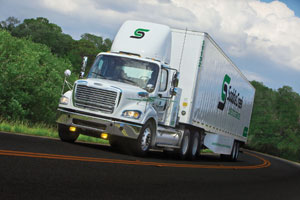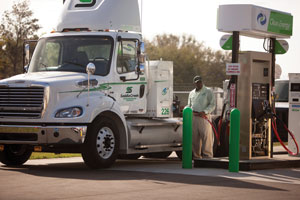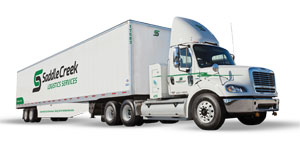When Saddle Creek Transportation, a subsidiary of Saddle Creek Logistics Services, ordered its first natural gas-powered tractors, the company had no illusions about what it was doing. “We knew when we decided to embark on our natural gas journey that we were going to be an early adopter of the technology for over the road transportation,” says Mike DelBovo, president. 
“We were committed in part, however, because natural gas is domestic,” DelBovo adds. “It is pure American and by utilizing CNG for our trucks, Saddle Creek and its customers are not going to be controlled by the spiking costs of diesel due to events happening in other places in the world.”
After taking delivery of its first 40 Freightliner Business Class M2 112 compressed natural gas (CNG) tractors earlier this year, a group of vehicles that has already run over two million miles, Saddle Creek has ordered an additional 62 natural gas M2s for delivery in 2012. The 102 CNG-powered tractors from Freightliner join 100 Mack Vision models in the operation. The fleet also has 55 tractors on lease from Ryder and Penske and uses the services of 140 owner-operators.
Headquartered in Lakeland, Fla., Saddle Creek is a third-party logistics company providing integrated supply chain solutions, including freight transportation services nationwide. Its total fleet of 335 tractors is domiciled in Florida, Georgia, North Carolina, Virginia, Texas and California.

Powered by Cummins Westport ISL G 8.9-liter natural gas engines, Saddle Creek’s Freightliner M2 112 CNG tractors are fitted with a 140-gal. Agility tank and fuel system, allowing for an approximate range of 550 to 575 miles per day, depending on the application.
Perfect location
“We haul a lot of heavy products for grocery and retail industries, so we needed a truck that could handle 80,000 lbs. consistently while having a range of least 550 miles on a single fueling,” DelBovo relates. “Our strategy is to domicile our fleets at our warehouse locations. Our largest fleet operations are located in Atlanta, Ga., and Lakeland, Fla., so the southeast regional market was the perfect location for our first natural gas trucks.
“While the size of the nine-liter natural engines initially caused us some concern due to the smaller horsepower than their diesel counterparts,” DelBolvo adds, “it hasn’t been a problem. When matched with an Allison six-speed automatic transmission, the trucks actually have better torque. Top speed on all of our tractors is governed at 65 MPH so road speed isn’t an issue for our drivers, who really like the CNG trucks.”
Saddle Creek also was pleased with the service and commitment from the suppliers involved in spec’ing and fielding its first natural gas tractors. “When evaluating equipment, our first priority was dealer and manufacturer relations and their commitment to stand behind their product,” DelBovo states.

“We toured dealerships and plants to understand their capabilities and ability to partner with our company to deliver a natural gas solution for over-the-road trucking. Freightliner and our local dealer, Tampa Truck Center, as well as Cummins, Allison and Agility have all been very valuable partners in the design and implementation process.”
DelBovo is also quick to credit Clean Energy, Saddle Creek’s CNG fueling station provider. “The units are fueled at our CNG station in Lakeland, and at a Clean Energy location in Atlanta,” he explains. “The savings in fuel cost is actually what pays for the additional equipment expense, and the better the utilization, the greater the savings and the shorter the return on investment. For us, the sweet spot is 400 miles per truck per day or better.”
Fuel savers
Saddle Creek also is using other fuel saving technologies on its most recent equipment. Included are Goodyear Fuel Max tires and Aero aerodynamic wheel covers on tractors. In addition, Aero LED indicators are placed on all valve stems to ensure that tires are always properly inflated. Transtex aerodynamic side fairings, Meritor Tire Inflation Systems by PSI and Eco-flaps aerodynamic mud flaps from Andersen Flaps are in place on trailers.
On the road, Saddle Creek relies on PeopleNet BLU.2 onboard communication systems in all of its tractors to help measure MPG performance and monitor idle time. “This gives us real time information on the tractor and the driver performance,” DelBovo says, “which we can use to help continually improve our efficiency.”

Recently, PeopleNet named Saddle Creek as a recipient of one of its 2012 Innovator of the Year Awards. “The company was instrumental in PeopleNet’s development of a program in which the onboard computer converts natural gas consumed by the engine to diesel equivalent gallons, so a comparative report can run to compare fuel metrics across their entire fleet of mixed vehicles (diesel and CNG),” the announcement read. Other Saddle Creek innovations cited by PeopleNet included a low-cost, quick-release system for the BLU.2 display that facilitates driver interaction and Department of Transportation (DOT) viewing of eDriver Log records.
| Saddle Creek Tractor Specs Model: Freightliner Business Class M2 112 compressed natural gas Wheelbase: 176 in. Engine: Cummins Westport ISL G 8.9-liter natural gas Transmission: Allison 3000 HS, six-speed automatic Wheels: aluminum Tires: 295/75R22.5 Goodyear G662 RSA Fuel Max 5th Wheel: Fontaine No-Slack 6000 Batteries: Alliance Fuel Tanks: Agility 140 DGE |
| Saddle Creek Trailer Specs Model: Utility DX4000 Length: 53 ft. Aerodynamic Side Fairings: Transtex Suspension: Hendrickson air ride Tires: Michelin Tire Inflation: Meritor Lighting & Electrical: LED Mud Flaps: Eco-flaps, Andersen Flaps |
Saddle Creek’s CNG tractors are maintained primarily at the fleet’s shop in Lakeland, staffed by eight mechanics, as well as management and support personnel. “We are continually learning more and more about the maintenance needs of our CNG-powered tractors,” DelBovo notes, “but at this time they are still essentially new vehicles. So far, the natural gas engines have been economical and dependable because they have a maintenance-free three-way catalyst, and do not require diesel particulate filter regeneration.
“At the same time,” DelBovo adds, “implementing a CNG fleet meant addressing training needs for mechanics, as well as drivers. The engines and CNG systems in particular were new to us and there were simply not readily available manuals to pull off the shelf on how to maintain these trucks. In the end, we developed the information we needed.”
In all cases, Saddle Creek’s goal is to lower its overall cost of operation. All costs for the fleet are managed using TMT Fleet Maintenance from TMW Systems. “We measure fleet effectiveness in cost per mile and downtime,” DelBovo says. “We also have implemented electronic reporting through the PeopleNet system to improve the speed of communications between our drivers and our maintenance team, and to reduce downtime.”
Watching closely
“We have already learned a lot from the first 40 natural gas tractors in our fleet and are excited to continue to implement natural gas technology across our truckload operations,” DelBovo continues. “Currently, we’re watching closely the development of the new 12-liter Cummins natural gas engines and intend to add some of those models to our fleet next year.”
For Saddle Creek Transportation, the environmental benefit of adopting CNG vehicles is already clear. Its 102 CNG trucks, DelBovo notes, save approximately 11.4 million lbs. of carbon each year, which equates to recycling over 150 million plastic bottles. As it expands its fleet and moves forward with natural gas technology, Saddle Creek is reinforcing its commitment to environmental sustainability and fuel-efficient operations.
